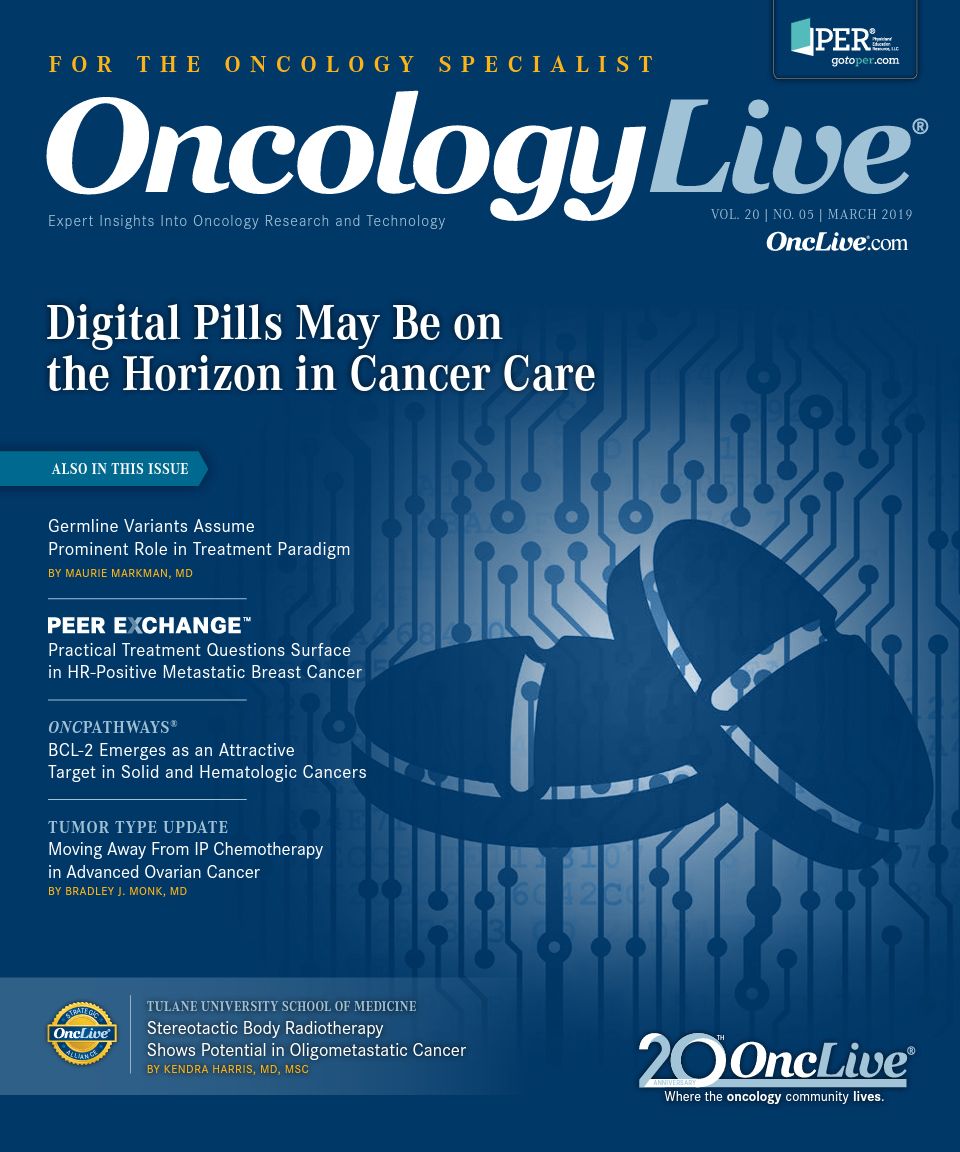Germline Variants Assume Prominent Role in Oncology Treatment Paradigm
Stunning technological advances in the ability to examine the molecular structure of human DNA have significantly reduced the time and costs associated with this process.

Maurie Markman, MD
Stunning technological advances in the ability to examine the molecular structure of human DNA have significantly reduced the time and costs associated with this process. Understandably, cancer investigators have been preoccupied with sifting for genetic information that might lead to favorable therapeutic action. Thus, not surprisingly, a large majority of clinical investigations have focused on mutations or other molecular aberrations within the cancer itself, rather than genomic data present in an individual’s germline. An increasing number of high-quality academic and commercial efforts have been designed to discover relevant cancer-related molecular events and corresponding antineoplastic strategies that can effectively target those abnormalities. These have achieved major success in multiple clinical settings.
It is well recognized that specific genetic findings within the germline can influence the prognosis for cancer, effectiveness of therapeutics, and potential for prevention (eg, BRCA mutation in ovarian cancer). Further, although this knowledge is not widely employed in routine clinical practice, it is known that the presence of specific germline polymorphisms can influence antineoplastic drug metabolism, which in turn may influence the development and severity of therapy-related toxicity. Several investigative groups continue to actively explore strategies to introduce testing for this into noninvestigational cancer care.
Understanding the significance of individual germline variations became far more important to the practicing oncologist with the development of PARP inhibitors, which have been highly clinically active in the management of epithelial ovarian cancer in the presence of BRCA mutations (germline or somatic). In addition, there is striking evidence that genetic abnormalities resulting in a microsatellite unstable clinical state characterize a population of advanced cancers that are particularly susceptible to checkpoint inhibitor immunotherapy.
Of course, germline genetic data in clinical oncology practice are used more commonly to determine the potential for increased risk (relative and absolute) that a certain cancer may develop in an individual or family. In the not-so-distant past, a clinician had to rely on obtaining a detailed family history to help define such risk, but today and increasingly in the future, risk can be determined by detailed knowledge of an individual’s germline, based on genomic analysis.
The relevance of this topic is evidenced by the substantial potential for the human genome to contain a molecular abnormality that may increase the risk of cancer. One prominent geneticist recently argued in a paper that genomic testing offers a very substantial benefit for a portion of the population. “A conservative estimate is that, unbeknownst to them, at least 1% of US [residents] have an identifiable genetic risk for cancer or heart disease that could be detected and clinically managed via a genetic screening approach. Identifying those 3 to 4 million persons and effectively mitigating that risk are worthy goals,” Michael F. Murray, MD, said.1
It is increasingly clear that we must continue to improve our understanding of the intricacy of individual germline molecular events. The seriousness of this challenge is illustrated by the critical issue of genetic variants. Simply discovering a mutation or uncommon polymorphism within a gene does not necessarily indicate that the abnormality results in a defect affecting the function of that gene’s product.
A recent study from 1 large commercial cancer-susceptibility laboratory found that of 1.67 million initial test results submitted to ordering physicians from 2006 through 2018, 59,955 “amended reports were issued due to variant reclassification.”2 The need for these amended reports resulted from the knowledge generated over this time interval that the actual risks of cancer associated with specific variants differed from what was originally thought. It is reassuring that, in this analysis, it was uncommon that an initial clinical report of a “pathologic/likely pathologic variant” or a “benign/ likely benign variant” was reclassified. But among unique variants of uncertain significance (n = 26,670), 7.7% (n = 2048) required reclassification. And although 91.2% of those reclassified were downgraded in severity (to benign/likely benign), 8.7% were upgraded (to pathologic/likely pathologic). These findings clearly and appropriately illustrate the tentative nature of certain conclusions and the need for continuous updating of relevant germline databases.
A highly provocative laboratory-based analysis has suggested an alternative strategy called saturation genome editing to more efficiently classify both the functional deficiency and pathogenic potential of specific BRCA1 gene variants.3 This technique may effectively provide a meaningful preliminary assessment of the cancer-related risks associated with novel genetic findings.
A second issue of importance involves the expanding knowledge of previously underappreciated, clinically relevant associations between specific germline abnormalities and the risk of particular malignancies. For example, although the relationship between mismatch repair deficiency and colon cancer is well established, a recent report of 1058 unselected patients with this malignancy found several additional known cancer-risk related genes within this population, including 11 individuals (1%) with BRCA1 or BRCA2 mutations.4 These data highlight the need to constantly update our knowledge of molecularly related risk factors, which in the future may have preventive, screening, or even therapeutic implications (eg, BRCA mutations).
Finally, I conclude this brief discussion of the rapidly evolving realm of cancer risk assessment with a note about a real-world experience with germline cancer—risk assessment for an unselected population who did not specifically undergo such testing due to a suggested family history.5 In a group of 50,726 individuals, 0.5% were found to have a pathologic BRCA mutation (n = 267; 35.6% BRCA1, 64.4% BRCA2). Knowledge of this clinically meaningful but relatively low percentage (1 of 200 screened individuals) is relevant in any consideration of establishing a population-based molecular screening program for cancer.
Perhaps an even more interesting observation from this study is the fact that approximately half of those documented to be BRCA1 or BRCA2 carriers had also provided their own data regarding family cancer history and yet did not satisfy current criteria to undergo genetic risk assessment testing.5 This suggests that, perhaps, current criteria should be broadened for sensitivity to family histories of BRCA1 and BRCA2.
References
- Murray MF. The path to routine genomic screening in health care. Ann Intern Med. 2018;169(6):407-408. doi: 10.7326/M18-1722.
- Mersch J, Brown N, Pirzadeh-Miller S, et al. Prevalence of variant reclassification following hereditary cancer genetic testing. JAMA. 2018;320(12):1266-1274. doi: 10.1001/jama.2018.13152.
- Findlay GM, Daza RM, Martin B, et al. Accurate classification of BRCA1 variants with saturation genome editing. Nature. 2018;562(7726):217-222. doi: 10.1038/s41586-018-0461-z.
- Yurgelun MB, Kulke MH, Fuchs CS, et al. Cancer susceptibility gene mutations in individuals with colorectal cancer. J Clin Oncol. 2017;35(10):1086-1095. doi: 10.1200/JCO.2016.71.0012.
- Manickam K, Buchanan AH, Schwartz MLB, et al. Exome sequencing-based screening for BRCA1/2 expected pathogenic variants among adult biobank participants. JAMA Netw Open. 2018;1(5):e182140. doi: 10.1001/jamanetworkopen.2018.2140.




